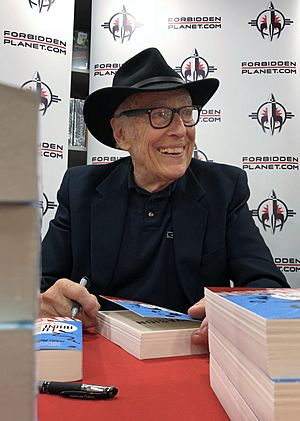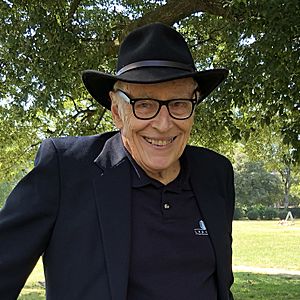Luke Rhinehart facts for kids
Quick facts for kids
Luke Rhinehart
|
|
|---|---|

Luke Rhinehart signing copies of Invasion in 2016.
|
|
| Born | George Cockcroft November 15, 1932 Albany, New York |
| Died | November 6, 2020 (aged 87) Canaan, New York |
| Occupation | Writer |
| Nationality | American |
| Genre | Humor |
| Notable works | The Dice Man (1971) Adventures of Wim (1986) The Search for the Dice Man (1993) |
| Signature | |
George Powers Cockcroft (born November 15, 1932 – died November 6, 2020) was an American writer. He was widely known by his pen name, Luke Rhinehart. A pen name is a fake name a writer uses instead of their real one.
He wrote novels, screenplays, and non-fiction books. He is most famous for his 1971 novel, The Dice Man. This book tells the story of a doctor who makes all his life choices by rolling a dice.
The Dice Man was very popular and became a cult classic. A cult classic is a book or movie that isn't always a huge bestseller but has a small, very dedicated group of fans. The book later had two follow-up novels: Adventures of Wim (1986) and The Search for the Dice Man (1993). He also wrote a guide called The Book of the Die (2000). Luke Rhinehart wrote many other books, but none were as successful as The Dice Man.
Contents
About the Author: Luke Rhinehart
Early Life and Education
George Powers Cockcroft was born on November 15, 1932, in Albany, New York. His parents, Donald and Elizabeth Cockcroft, both went to college. George grew up in Albany, where his father worked as an electrical engineer.
He went to The Albany Academy and finished in 1950. He then earned a bachelor's degree from Cornell University in 1954. He continued his studies at Columbia University, getting a master's degree in 1956. In 1964, he earned a PhD in American literature from Columbia. A PhD is the highest university degree you can get.
After his studies, he became a university professor. He taught different subjects, including courses on Zen and Western literature.
How The Dice Man Was Born
In 1969, George Cockcroft was teaching a study abroad program in Mallorca, an island in Spain. One day, an English publisher visited a cafe in the same village, Deià. George gave him part of his book, The Dice Man, to read.
The publisher liked it and offered him money to publish the book. Soon after, George was encouraged to take a break from teaching. He stayed in Mallorca to finish his novel. The publisher then sold the rights to the book in America for a lot of money. Within a year, they also sold the rights to make a movie. This allowed George to stop teaching and become a full-time writer.
Family and Travels
George Cockcroft married his wife, Ann, on June 30, 1956. Ann later became a writer too, publishing romance novels and poetry. They had three children together. His brother, James Cockcroft, also became a writer, focusing on Latin American history.
The Cockcroft family traveled a lot, sailing and living in Mallorca in the late 1960s and early 1970s. They even lived on a large boat called a catamaran. This boat later inspired the one in his novel Long Voyage Back. In the mid-1970s, they moved back to the United States. They spent some time in a commune, which is a group of people living together and sharing things. After that, they moved to an old farmhouse in upstate New York.
Later Years and Passing
I am old now. Illusions are losing their grip. They are dropping off me like leaves from an autumn tree. How nice.
On August 1, 2012, a message was sent to 25 friends saying that "Luke Rhinehart is dead." It turned out to be a playful trick by George Cockcroft himself! People reacted with sadness, but also with amusement.
George Cockcroft passed away on November 6, 2020, at the age of 87.
The Dice Man: A Famous Novel
Luke Rhinehart's most famous novel, The Dice Man, came out in 1971. It tells the story of a psychiatrist, a type of doctor who helps people with their mental health. This psychiatrist decides to make all his daily choices by rolling dice.
The book's cover boldly stated, "Few novels can change your life. This one will." In the United States, this was changed to, "This book will change your life."
It was not clear at first if the book was a true story or fiction. This was because the main character and the author shared the same name, Luke Rhinehart. People have been curious about this ever since the book was published. A journalist named Emmanuel Carrère wrote a long article in 2019. He showed that George Cockcroft was a real English professor living in an old farmhouse. He was a husband, a father of three, and cared for a child with special needs.
The Dice Man was well-liked by critics. It quickly became, and still is, a cult classic. It didn't sell well in the United States at first. However, it was very popular in Europe, especially in England, Sweden, Denmark, and Spain. In 2017, Tanya Gold wrote that the book was still being printed after 45 years. It had become famous, had many dedicated fans, and sold over 2 million copies. It was translated into as many as 27 languages and sold in 60 countries.
In 1995, the BBC called it "one of the fifty most influential books of the last half of the twentieth century." In 1999, Loaded magazine named it "Novel of the Century." In 2013, Alex Clark of the Telegraph chose it as one of the fifty greatest cult books of the last hundred years.
Other Books by Luke Rhinehart
Funny and Thought-Provoking Novels
Many of Luke Rhinehart's books are similar in style to The Dice Man. They often switch between different points of view. They also include parts from made-up documents. This creates a "cubist" way of telling a story. It means the story is told from many different angles, like a cubist painting. Rhinehart said he always felt like he had "a dozen different selves."
- Adventures of Wim (1986): This book retells the story of Wim, a boy from the Montauk nation. He is believed to be their savior and searches for the Ultimate Truth. The story is told using fictional documents.
- The Search for the Dice Man (1993): This story takes place twenty years after The Dice Man. It follows Luke Rhinehart's son, Larry. Larry has built a very organized life, rejecting his father's ideas about chance. But when he tries to find his father, Larry's orderly life becomes chaotic.
- Naked Before the World (2008): This book was written around the same time as The Dice Man. It celebrates the lives of hippies and other people in 1960s Mallorca. The story is about Katya, a young art student. She arrives on the island and enters a world of artists and struggles to find herself.
- Jesus Invades George: An Alternative History (2013): This book is set in 2007. It imagines that President George W. Bush is taken over by the spirit of Jesus Christ. The story humorously shows the problems in government and modern politics.
- Invasion (2016): In this novel, aliens come to Earth just to have fun. They are super smart and can change into many forms. They play games with human culture and technology. This chaos shows how simple our society is and suggests new ways for humans to live. A sequel called The Hairy Balls and the End of Civilization is planned.
Traditional Novels
- Matari (1975): This book was later republished as White Wind, Black Rider (2008). It is a historical fiction story set in 18th-century Japan. The beautiful Matari runs away from her husband, a samurai lord who wants to kill her. Two Zen poets join her on her journey. It's a poetic tale about love, honor, and right and wrong.
- Long Voyage Back (1983): This is an action-adventure novel about sailing. A group of people on a boat called a trimaran try to survive after a nuclear war.
Non-Fiction Books
- The Book of est (1976): This book describes a personal growth course called Erhard Seminars Training (est). The book puts the reader in the place of someone taking the course. This way, readers can "experience" the training for themselves.
- The Book of the Die (2000): This is a "handbook of dice living." It helps readers learn to use chance and live more freely. It suggests that people should let go of the idea that they can control everything. This guide uses proverbs, essays, cartoons, poems, and movie scenes. It helps people create a more playful and surprising life.
Other Creative Works
Luke Rhinehart wrote nine screenplays, which are scripts for movies. Five of them were based on his novels. Two others were direct sequels to The Dice Man, featuring the original character. Two screenplays were original ideas.
In 2018, a music and spoken word album called The Dice Man Speaks was released. On it, Luke Rhinehart performs spoken word parts over music.
How The Dice Man Influenced Culture
The Dice Man has had a big impact on many people and things.
- Richard Branson, the famous businessman, said he used dice to decide which bands to sign for his company, Virgin Records. He did this after reading The Dice Man and deciding to follow its ideas.
- Journalist Ben Marshall spent two years (1998-2000) trying to live by rolling dice. He wrote about his experiences in Loaded magazine. The magazine later named Cockcroft/Rhinehart the "novelist of the century."
- A TV travel series called The Diceman aired from 1998 to 2000 on the Discovery Channel. In this show, the places people traveled to and what they did were decided by rolling a die.
- In 1999, UK Channel 4 broadcast Diceworld. This was a TV show about Cockcroft/Rhinehart and people influenced by his books. It helped bring new interest to his work. Another show, Dice Life: The Random Mind of Luke Rhinehart, was made in 2004.
- A play called The Dice House, inspired by The Dice Man, opened in the United Kingdom in 2001. It later played in London's West End in 2004.
- Many songs have been inspired by the book. These include "Dice Man" by The Fall (1979) and "Such A Shame" by Talk Talk (1984). Musician Richard D. James used "The Dice Man" as a nickname for one of his songs.
- The UK comic 2000 AD published a magazine called Dice Man in 1986. It was a Gamebook where readers made choices by rolling dice.
- The beer company Rolling Rock launched an ad campaign in the UK in 1998 based on The Dice Man. This campaign included a short-lived website called Dice Life.


